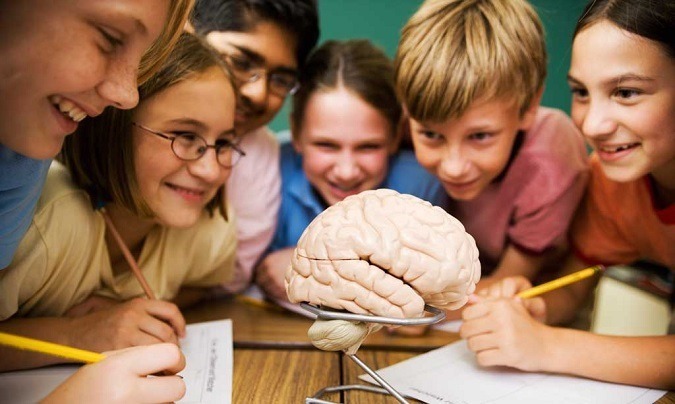Meta-analysis finds value in teaching the science of neuroplasticity, especially for math achievement among at-risk students
 ___
___
The ‘Brain’ in Growth Mindset: Does Teaching Students Neuroscience Help? (Education Week):
“Teaching students the science of how their brains change over time can help them see intelligence as something they can develop, rather than innate and unchangeable, finds a new analysis of 10 separate studies online in the journal Trends in Neuroscience and Education.
Teaching students the concept of neuroplasticity—the ability of the brain to make new neural connections as a result of experience—is a common tactic in helping students develop a so-called “growth” rather than “fixed” mindset … on average, such interventions improved students’ motivation, they particularly benefited students and subjects which prior studies have shown are at high risk of developing a fixed mindset. For example, black students at risk of “stereotype threat”—the fear that one will reinforce a negative stereotype of your student group—showed significantly higher increase in motivation and enjoyment of science after a neuroscience-based mindset program than did students who were not at risk of stereotype threat … The effect of brain-based mindset interventions was also stronger in math, a content area in which prior studies have shown students are more likely to believe skill is innate rather than malleable. A growth mindset intervention based on neuroplasticity,” the authors found, “seems to be mostly beneficial in terms of math achievement for at-risk students (low-achieving and economically disadvantaged students).”
The Study:
Effects of Teaching the Concept of Neuroplasticity to Induce a Growth Mindset on Motivation, Achievement, and Brain Activity: A Meta-Analysis (Trends in Neuroscience and Education).
- Abstract: Inducing a growth mindset in students has been shown to impact positively on motivation, academic achievement, and brain activity. However, some studies have yielded different results and authors rarely provide reasons to explain this inconsistency. In an effort to better understand the conflicting evidence, we conducted a meta-analysis of 10 peer-reviewed studies including participants from age 7 to adulthood. Results show that inducing a growth mindset by teaching neuroplasticity has an overall positive effect on motivation, achievement, and brain activity. The results also reveal that this intervention seems more beneficial for at-risk students, especially regarding mathematics achievement. These findings thus suggest that inconsistent evidence across empirical studies could be explained by students’ characteristics and subject area.


